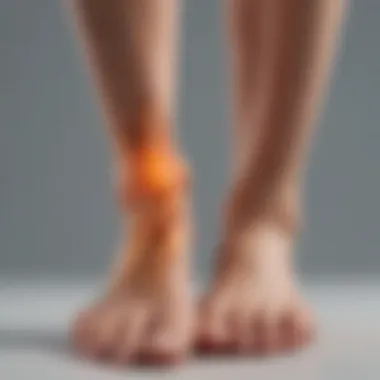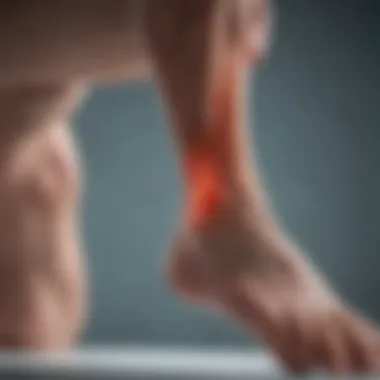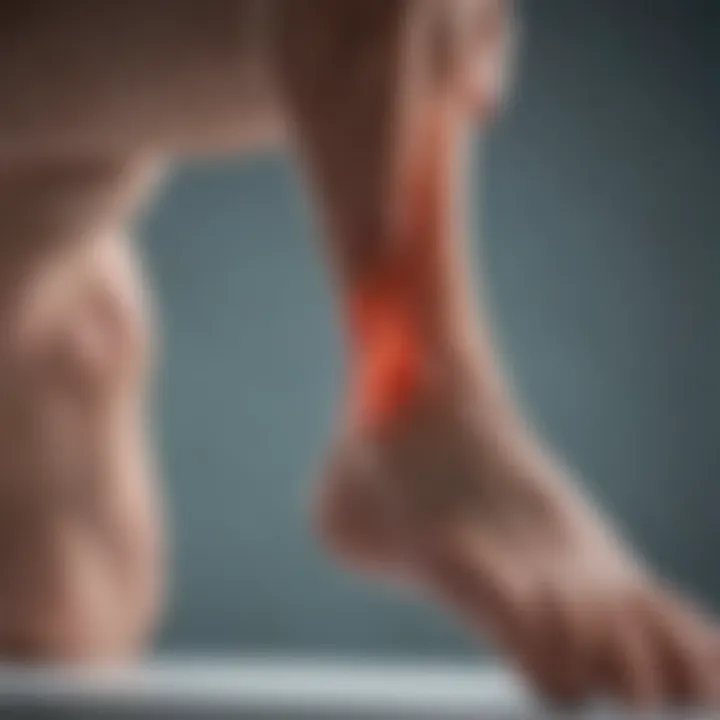Kidney Health's Hidden Impact on Foot Pain


Intro
Kidney health is a critical aspect of our overall well-being. Many individuals may not realize how closely kidney function is intertwined with various bodily systems. One area that can reflect kidney health is the feet. Understanding this relationship can shed light on potential health risks and enhance treatment approaches.
This article delves into the unique connection between kidney health and foot pain. By exploring underlying causes and physiological mechanisms, we aim to underscore the relevance of these often-overlooked symptoms. Readers can expect to learn about symptoms that link poor kidney function to foot pain, risk factors involved, and ways to diagnose these interrelated health concerns.
Key Concepts and Terminology
Definition of Key Terms
To fully grasp the dynamics of kidney health and foot pain, it is essential to define some key terms:
- Kidney Dysfunction: Refers to any condition that impairs the kidneys' ability to filter blood, leading to toxic build-up in the body.
- Peripheral Neuropathy: A result of nerve damage causing pain, tingling, or weakness in the extremities.
- Edema: Swelling caused by fluid retention, often seen in the feet when kidney function declines.
Concepts Explored in the Article
This article will cover these fundamental concepts:
- How kidney dysfunction can produce symptoms in the extremities.
- Indicators that may assist clinicians in recognizing foot pain as a possible sign of kidney issues.
- Effective treatment options that address both foot pain and underlying kidney problems.
Findings and Discussion
Main Findings
Research has shown a significant link between kidney health and lower extremity pain. Some findings include:
- Individuals with chronic kidney disease often experience symptoms in their feet, such as numbness or swelling.
- Peripheral neuropathy, linked to kidney dysfunction, typically presents as tingling or discomfort that affects mobility.
- Edema can cause pain and discomfort. This condition can be exacerbated when kidney function is compromised, leading to fluid build-up in the feet.
An understanding of these findings enables healthcare professionals to approach the treatment of patients with foot pain with a more holistic view.
Potential Areas for Future Research
As studies progress, various areas for future exploration are becoming clear:
- Investigating the precise mechanisms by which kidney dysfunction leads to foot pain and other peripheral symptoms.
- More extensive longitudinal studies that track kidney health alongside foot pain among varied patient groups.
The Anatomy of the Kidneys
The kidneys play a vital role in the human body, functioning as crucial organs in maintaining overall health. Understanding their anatomy is fundamental to comprehending how kidney health can influence foot pain. The kidneys are bean-shaped organs positioned on either side of the spine, approximately at the level of the lower back. Each kidney consists of an outer cortex and an inner medulla, which work together to filter blood, eliminate waste, and regulate fluids. This filtering process not only affects what is retained in the body but also what is expelled, making it an essential component in homeostasis.
One significant aspect of the kidneys is their role in regulating blood pressure. They do this by controlling the volume of blood and the balance of salts and electrolytes. With impaired kidney function, these regulatory mechanisms can falter, leading to complications that may manifest in various body parts, including the feet. It is crucial to note that the renal system impacts the musculoskeletal system, often leading to discomfort or pain in extremities when kidney health is compromised.
Kidney Structure and Function
The structure of the kidneys allows them to perform their functions effectively. Each kidney contains approximately one million nephrons, which are the functional units responsible for filtering blood. Blood enters the kidneys through the renal artery, where it is processed. The nephrons filter waste products and excess substances, which are then excreted as urine through the ureters into the bladder.
The interaction between kidney structure and function is tightly interwoven. Any changes in the structure, such as scarring or damage to nephrons, can lead to a decline in kidney function. This decline can leave waste products in the bloodstream, which can eventually affect other systems, including the nervous system, thereby leading to sensations of pain in the feet.
Role of Kidneys in Homeostasis
Homeostasis is a complex process that keeps the body’s internal environment stable. The kidneys contribute significantly to this balance by regulating blood pH, electrolyte levels, and fluid volume. When kidney function deteriorates, these regulatory capabilities can become impaired. For example, a retention of potassium due to kidney dysfunction can result in conditions like hyperkalemia, which may influence nerve signaling to the feet, causing pain or discomfort.
Moreover, the kidneys produce hormones such as erythropoietin, which is essential for red blood cell production. Reduced red blood cells due to kidney problems can lead to anemia, which often results in fatigue and weakness in the legs and feet, further complicating mobility and overall foot health.
"Understanding the structure and role of the kidneys is crucial for recognizing how kidney health impacts foot pain. Their functions are interdependent with various systems in the body."
In summary, the anatomy of the kidneys is not merely about their structure but also about their functional importance in overall health. A clear comprehension of this aspect lays the groundwork for exploring how kidney dysfunction can translate into symptoms of foot pain and further downstream effects in the body.
Understanding Foot Pain
Foot pain is a significant health concern affecting many individuals. Understanding this pain is crucial as it can be symptomatic of larger health issues, including kidney problems. When addressing the topic of kidney health, it is essential to include foot pain as it can provide insightful clues about overall well-being.
Recognizing the connection strengthens the link between systemic health and localized symptoms. Foot pain can stem from various factors, which makes it a multifaceted subject. Many people often underestimate foot pain, dismissing it as a minor issue or a sign of aging.
However, untreated foot pain can lead to decreased mobility and further complications. Thus, it is vital to bring awareness to the underlying causes, so individuals can seek appropriate medical attention. For example, conditions like diabetes, a common cause of foot pain, also relate directly to kidney function.
Common Causes of Foot Pain
Foot pain can arise from numerous causes, ranging from injuries to chronic conditions.
- Arthritis: Both osteoarthritis and rheumatoid arthritis can lead to joint pain in the feet.
- Plantaar Fasciitis: This is a common condition that causes pain in the heel and bottom of the foot.
- Neuropathy: Nerve damage from diabetes often manifests as foot pain and discomfort.
- Poor Footwear: Inadequate shoe support can lead to various foot issues, causing pain.
Each of these conditions may not directly relate to kidney health, but when kidney issues arise, they can exacerbate pre-existing foot conditions. Thus, understanding the multifaceted causes of foot pain is necessary when exploring the link between kidney health and lower limb discomfort.
The Impact of Lifestyle Choices
Lifestyle choices play a significant role in both kidney and foot health. Poor diet, lack of physical activity, and habits like smoking can heighten the risk of developing chronic conditions that lead to foot pain and kidney dysfunction.
- Diet: High salt intake can worsen kidney function and lead to fluid retention, which may manifest as swelling and discomfort in the feet.
- Sedentary Lifestyle: Not engaging in regular physical activity can lead to weight gain, increasing strain on foot structures.
- Hydration: Inadequate fluid intake can affect kidney health, which in turn can reflect in your feet due to reduced circulation and swelling.
Making informed lifestyle choices is crucial. Better nutrition, regular exercise, and hydration level optimization significantly lower the risk of kidney damage and its related symptoms. Understanding these links can compel individuals to seek changes in their daily habits, ultimately fostering better health outcomes.
Physiological Connections Between Kidneys and Feet
Understanding the physiological connections between kidneys and feet is essential. The kidneys perform vital functions, including filtering blood, regulating fluid balance, and producing hormones. Foot pain can be a lesser-known consequence of kidney dysfunction. This connection often goes unnoticed but can provide insight into the overall health of an individual. Recognizing signs and symptoms related to the feet may assist in the early detection of kidney issues.
Maintaining optimal kidney function is crucial for supplying adequate blood flow and nerve signal transmission to the feet. The interrelation highlights why healthcare professionals must consider both organs when assessing patient health.
Blood Circulation and Kidney Function
Effective blood circulation is central to kidney health. The kidneys are responsible for filtering and purifying blood. Poor kidney function can result in the accumulation of waste products and fluid overload, leading to complications in circulation. When blood flow to the extremities is hindered, it may cause varied manifestations, notably pain or swelling in the feet.


This altered circulation plays a critical role in developing symptoms like edema. Edema occurs when excess fluid accumulates in tissues, causing swelling that can affect mobility. High blood pressure, often associated with kidney disease, can further constrain blood flow. As such, enhancing kidney health naturally contributes to improved circulation.
Key Points:
- Kidneys filter blood: A decline in kidney function results in an inability to filter effectively.
- Fluid retention: Kidney issues lead to liquid buildup, causing feet to swell.
- Blood pressure: High blood pressure can worsen blood circulation, causing pain.
Nerve Implications
Nerve function is another important element affecting the feet, stemming from kidney health. The kidneys influence various hormones, including those related to electrolyte balance and nerve health. Diabetic nephropathy, for instance, occurs from diabetes complications, causing nerve damage. This situation often results both in symptoms in kidney function and foot sensation.
Peripheral neuropathy is common among individuals with reduced kidney function. It results in altered sensations, such as tingling or numbness in the feet. This deterioration occurs because the kidneys fail to maintain adequate levels of essential nutrients and electrolytes.
The correlation between kidney health and nerve implications must not be overlooked. Identifying these connections allows for targeted treatments aimed at both kidney health and foot wellness.
Key Points:
- Hormone Regulation: Hormones regulate nerve function, linking kidney health to foot sensation.
- Electrolyte Balance: Disturbances can lead to neuropathy, affecting feelings in the feet.
- Diabetic Neuropathy: A common issue that presents symptoms linked both to foot and kidney health.
Recognizing and addressing the physiological connections between the kidneys and the feet improves the overall understanding of health issues. This awareness can lead to more effective intervention strategies, enhancing both kidney function and foot well-being.
Symptoms of Kidney Issues Reflecting in Foot Pain
Understanding the symptoms of kidney issues is crucial, especially when they reflect in foot pain. This section emphasizes how kidney dysfunction can present in ways that might not be immediately obvious, yet can significantly affect overall well-being. Recognizing these symptoms early can lead to prompt medical attention, ultimately enhancing patient outcomes.
When we talk about kidney health, many may not realize the interconnectedness of bodily systems. Issues within the kidneys can manifest in the feet, a reflection of broader health concerns. This connection underscores the importance of monitoring kidney function, particularly for individuals experiencing inexplicable foot pain.
Awareness of these symptoms not only helps in early diagnosis but also guides treatment approaches. With an understanding of specific symptoms, patients can communicate more effectively with healthcare providers, paving the way for accurate diagnostics and timely interventions.
Edema in the Feet
Edema, or fluid retention, in the feet can be a direct consequence of kidney dysfunction. When kidneys are not functioning properly, they may struggle to filter excess fluids from the bloodstream. This can lead to swelling that is often noticeable in the lower extremities.
Key points about edema include:
- Causes: Renal diseases cause impaired filtration, leading to fluid buildup. Conditions like Chronic Kidney Disease often result in edema.
- Symptoms: Patients may notice increased swelling, tightness in shoes, and changes in skin texture. These symptoms can be uncomfortable and might restrict mobility.
- Implications for Health: Persistent edema can lead to skin breakdown and infection if left untreated. Monitoring foot health is essential for individuals with kidney conditions.
"The presence of edema should be taken seriously. It is more than just a nuisance; it indicates the body's struggle to maintain balance."
Management of edema involves both lifestyle alterations and medical interventions, tailored to the underlying kidney issues. For individuals noticing changes in their feet, this symptom should not be ignored.
Altered Sensation in Feet
Another significant symptom of kidney problems is altered sensation in the feet, which may include numbness, tingling, or a burning sensation. This can signal nerve damage or neuropathy associated with chronic kidney issues.
Vital aspects to consider:
- Nerve Damage: The nerves controlling sensation may be affected by the buildup of waste products and imbalances in electrolytes due to kidneys' inefficiency.
- Symptoms: Individuals may experience reduced feeling, or the sensation of pins and needles. These changes can impact balance and increase the risk of falls.
- Critical Consequences: Altered sensations can lead to injuries. Patients might not feel cuts or blisters on feet, making these injuries more severe if not promptly addressed.
Addressing altered sensations often requires a comprehensive approach to kidney health. This entails proper management of underlying kidney disease, possibly involving medication, dietary changes, and physical rehabilitation to ensure safety in mobility.
These symptoms can often overlap, making it essential for individuals at risk to maintain regular check-ups with healthcare providers. By doing so, they can safeguard their kidney and foot health effectively.
Kidney Diseases Associated with Foot Pain
Kidney diseases are not just confined to the renal system; they can have widespread effects throughout the body, particularly in the feet. Understanding this connection is crucial, as it allows for early detection and treatment of underlying health issues. When kidney function declines, toxins and excess fluids can accumulate, leading to various symptoms that may manifest in the lower extremities. Recognizing the relationship between kidney diseases and foot pain can enhance patient outcomes through timely healthcare interventions and education.
Chronic Kidney Disease
Chronic Kidney Disease (CKD) is a progressive condition characterized by a gradual decline in kidney function. This slow deterioration can lead to significant complications, affecting various body systems, including the feet. Patients with CKD often experience a range of symptoms such as edema and neuropathy.
Key points about Chronic Kidney Disease and foot pain include:
- Edema: Individuals may develop fluid retention in the feet and ankles, resulting in swelling and discomfort. This can impair mobility and significantly impact the quality of life.
- Peripheral Neuropathy: Damage to the nerves can lead to altered sensations in the feet, such as tingling or numbness, making it difficult for patients to walk or choose appropriate footwear.
- Increased Risk of Infections: CKD can weaken the immune system, leading to an elevated risk of infections in the feet, which further complicates recovery and treatment.
Diabetic Nephropathy
Diabetic Nephropathy is a kidney disorder that affects individuals with diabetes, particularly those who have uncontrolled blood sugar levels over a long period. This condition reflects the systemic impact of diabetes on both renal function and peripheral health. The combination of diabetes and kidney disease can exacerbate foot problems through several mechanisms.
Factors to consider with Diabetic Nephropathy:
- Blood Sugar Control: Poorly controlled diabetes can lead to both kidney damage and peripheral neuropathy, resulting in severe foot pain and complications. Patients must manage their blood sugar levels diligently to protect the kidneys and feet.
- Vascular Issues: Diabetes can affect blood circulation, leading to reduced blood flow to the extremities. This decrease can cause pain and delayed healing of foot wounds, contributing to further complications.
- Foot Injuries and Ulcers: Neuropathy may lead to unnoticed injuries due to lack of sensation. If left untreated, minor foot injuries can escalate into serious conditions, such as ulcers or even infections requiring medical intervention.
Understanding the connection between kidney diseases, especially Chronic Kidney Disease and Diabetic Nephropathy, and foot pain is essential for improving patient care and outcomes. By recognizing the symptoms early, healthcare professionals can implement necessary treatments and lifestyle changes, promoting better holistic health.
Diagnostic Approaches
The significance of accurate diagnostics includes:
- Identification of Underlying Conditions: Understanding how kidney health is linked to foot pain can reveal specific conditions such as metabolic disturbances or neuropathy.
- Tailored Management Plans: By pinpointing the source of the problem, healthcare providers can craft personalized treatment plans that may involve nephrology or podiatry consultations.
- Preventive Measures: Early detection allows for the implementation of lifestyle changes or medical interventions before the symptoms progress too far.
Clinical Evaluations
Clinical evaluations serve as the cornerstone of diagnoses when investigating the interplay between kidney health and foot pain. This process starts with a comprehensive patient history and physical examination, focusing on:
- Medical History: A detailed history will encompass personal and family health, specifically looking for instances of kidney disease, diabetes, or cardiovascular issues.
- Physical Examination: Healthcare providers will examine the feet for indicators of pain, swelling, or skin changes which may suggest kidney-related issues.
- Symptom Correlation: Understanding the timeline and nature of foot pain in relation to other symptoms like swelling or changes in urination habits can offer vital clues.
A thorough clinical evaluation not only identifies symptoms but also facilitates discussions about previous treatments and lifestyle factors. This information is critical because various factors influence the kidneys' health, ultimately impacting the feet.
Imaging Techniques
Imaging techniques are another vital aspect of diagnostic approaches to elucidate the connections between kidney health and foot pain. These methods can provide visual assessments that are invaluable in evaluating structural or functional abnormalities.
- Ultrasound: This non-invasive test offers real-time images of the kidneys and can help identify conditions such as cysts, obstructions, or inflammation that may indirectly affect foot health.
- X-rays: While typically used to evaluate bones, X-rays can indicate issues linked to changes in biochemistry due to kidney dysfunction, like mineral imbalances.
- MRI and CT Scans: These advanced imaging techniques provide detailed images of both the kidneys and vascular structures. They can help detect complications in kidney function which may relate to blood supply issues affecting the feet.


Through the combination of clinical evaluations and imaging techniques, healthcare professionals can gather comprehensive insights, ensuring a holistic approach to diagnosis. Together, these methods enhance the understanding of how kidney health directly or indirectly influences foot pain, guiding effective treatment options.
Treatment Strategies
In addressing the connection between kidney health and foot pain, effective treatment strategies are crucial. These strategies not only alleviate symptoms but also tackle the root causes of the underlying issues. Understanding and implementing these approaches can significantly enhance the quality of life for individuals experiencing challenges in both these areas. Treatment can be diverse, incorporating pharmacological interventions and physical rehabilitation methods. Each of these plays a vital role in mitigating discomfort and improving overall health outcomes.
Pharmacological Treatments
Pharmacological treatments refer to medically prescribed medications aimed at addressing various health complications related to kidney function and associated foot pain. These treatments can vary based on the specific condition at hand. Common medications used may include analgesics for pain relief, diuretics to help reduce fluid retention, and medications aimed at managing chronic kidney disease, such as erythropoiesis-stimulating agents.
Using analgesics helps in managing the pain symptoms directly. These medications can range from over-the-counter options like ibuprofen to prescription-strength pain relievers. Diuretics, on the other hand, may aid in reducing edema, which can contribute to discomfort in the feet.
Some important considerations include:
- Correct Dosage: Always following doctor guidelines to avoid adverse effects.
- Monitoring for Side Effects: Regular check-ins are important to adjust treatment as necessary.
- Patient History: Each individual's medical background should guide the treatment plan, ensuring safety and efficacy.
Physical Therapy and Rehabilitation
Physical therapy serves as another pillar in the treatment strategies aimed at alleviating foot pain related to kidney issues. It promotes mobility, strength, and overall function. Therapists can tailor specific exercises that not only address foot pain but also support overall kidney health through improved circulation.
Physical therapy can include:
- Stretching Exercises: These can alleviate stiffness and improve flexibility in the feet and legs.
- Strength Training: Building muscle strength in the lower extremities can help support the weight-bearing activities, thereby reducing strain.
- Balance Training: Helps in preventing falls, especially critical in individuals experiencing altered sensation or weakness due to kidney-related issues.
Rehabilitation may also incorporate education on proper footwear and foot care, which is vital for those with underlying kidney disease. Maintaining foot hygiene and checking for any injuries or changes can prevent complications, ensuring that individuals manage both kidney health and foot conditions effectively.
"By integrating pharmacological treatments with physical rehabilitation, patients can achieve a comprehensive approach to managing foot pain tied to kidney health."
Preventive Measures
Preventive measures are crucial when it comes to maintaining kidney health and, consequently, minimizing foot pain. Many individuals overlook the early signs of kidney issues until the symptoms are severe. Addressing and integrating preventive strategies not only cherishes kidney health but also preserves overall well-being. Here, we dive into essential elements and benefits of preventive actions.
Lifestyle Modifications
Making specific lifestyle modifications can have a substantial impact on kidney function and may help prevent related foot issues. The choices one makes concerning diet, exercise, and hydration are particularly relevant. For instance, a balanced diet rich in fruits, vegetables, whole grains, and lean proteins is advisable.
- Limit sodium intake: Reducing salt consumption can lower blood pressure, which is beneficial for kidneys.
- Stay hydrated: Adequate fluid intake helps kidneys efficiently remove waste products.
- Exercise regularly: Physical activity boosts circulation and reduces the risk of diabetes and hypertension.
- Avoid smoking: Quitting tobacco use is vital for preserving kidney health and reducing the odds of circulatory issues that can affect the feet.
These lifestyle changes not only benefit kidney health but also enhance overall life quality. Individuals who adopt such measures often find improved energy levels and reduced incidences of foot pain linked to poor kidney function.
Monitoring Kidney Health
Regular monitoring of kidney health is a fundamental aspect of preventive care. Understanding one’s renal health status allows for early intervention, which is particularly critical for individuals at risk of conditions such as chronic kidney disease or diabetic nephropathy.
- Routine check-ups: Regular visits to a healthcare professional can catch changes in kidney function over time. Kidney function tests, including serum creatinine tests and urinalysis, are recommended.
- Blood pressure monitoring: Hypertension is a significant risk factor for kidney damage. Keeping blood pressure in check can significantly affect overall kidney health.
- Blood sugar monitoring: For individuals with diabetes, regular monitoring can prevent complications related to both kidney and foot health.
"The earlier kidney issues are detected, the simpler it is to manage them and avoid severe complications that may reflect in foot pain."
Being proactive in assessing kidney health is an essential element in maintaining both kidney function and foot comfort. Regular assessment slogans the importance of being in tune with one's own body and its signals, potentially preventing future issues.
In summary, preventive measures combine lifestyle adjustments and consistent health monitoring. The integration of these approaches fosters a holistic view toward maintaining kidney and foot health, underscoring the interconnected nature of these systems.
The Role of Nutrition in Kidney and Foot Health
Nutrition plays a critical role in maintaining kidney health and, by extension, the health of the feet. Poor dietary habits can exacerbate kidney disease, leading to systemic issues that often manifest as foot pain. A balanced diet helps in preventing and managing kidney problems and supports optimal function of bodily systems. Understanding the nutritional needs related to kidney and foot health can empower individuals to make informed dietary choices that contribute to their overall well-being.
Dietary Considerations for Kidney Health
When discussing dietary considerations for kidney health, it is essential to focus on several key factors. First, a diet low in sodium is crucial, as excessive salt intake can lead to water retention and increased blood pressure, straining the kidneys. Second, limiting protein intake may be necessary for individuals with compromised kidney function; excessive protein can lead to waste accumulation, further burdening the kidneys.
Additionally, incorporating fruits and vegetables rich in antioxidants helps in reducing oxidative stress on kidney tissues. Foods like berries, spinach, and sweet potatoes should be included in the diet.
It's essential to monitor potassium and phosphorus levels, as these minerals can accumulate when kidney function declines, resulting in serious health issues.
Balanced nutrition is vital to prevent complications associated with kidney disease.
In summary, adopting a kidney-friendly diet involves:
- Reducing sodium intake
- Limiting protein consumption
- Focusing on fruits and vegetables rich in antioxidants
- Monitoring potassium and phosphorus levels
Nutritional Impact on Foot Well-being
Nutrition significantly influences foot health, particularly for individuals with kidney issues. Poor circulation, often a result of kidney problems, can lead to pain or discomfort in the feet. Adequate nutrition ensures proper blood flow and nourishes tissues. Nutrients like vitamin E and omega-3 fatty acids can reduce inflammation, potentially alleviating foot pain.
Furthermore, hydration is vital. Proper fluid balance helps prevent edema, or swelling, in the feet. In contrast, dehydration can exacerbate kidney problems and consequently impede foot health.
Lastly, maintaining a healthy weight through a balanced diet positively affects foot health. Excess weight can place additional stress on the feet, causing or worsening pain.
Patient Stories and Experiences
Patient stories provide a unique lens through which to understand the connection between kidney health and foot pain. These narratives often illuminate the real-world implications of medical conditions. They go beyond clinical signs and numbers by humanizing the statistics and allowing for a deeper comprehension of individual experiences. Such stories can reveal patterns that might not be captured in typical medical literature. They highlight the complexity of symptoms that patients endure and the multifaceted nature of their conditions.
In the context of kidney health, patient experiences can illustrate how insufficient renal function may lead to foot conditions. Symptoms like swelling, pain, or altered sensations often prompt individuals to seek medical advice. Sharing these stories can foster awareness among both patients and healthcare providers about the broader impacts of kidney disease. Moreover, these accounts often include the identification of symptoms that initially may have been overlooked or misattributed to other causes.
Case Studies
Case studies serve as detailed reports on individual patients and their trajectories through diagnosis, treatment, and adjustment to living with kidney concerns and foot pain. An example could be a retiree who experienced sudden foot swelling. Initially, he attributed it to aging or past injuries. Upon further investigation, it was discovered that he was suffering from chronic kidney disease. His journey showcases the importance of paying attention to seemingly isolated symptoms.
Case studies like this one not only help clinicians recognize similar signs in other patients, but they also illustrate the variability in symptom presentation. One person's foot pain might stem from fluid retention due to kidney issues, while another might experience neuropathy associated with diabetes that links both feet and kidneys. These stories are critical for both educational purposes and understanding patient narratives across the healthcare spectrum.
Qualitative Insights


Qualitative insights derived from patient narratives allow for a comprehensive view of the lived experiences individuals with kidney health issues and foot pain encounter. These insights can reveal emotional responses, day-to-day challenges, and coping mechanisms that patients employ. Understanding these dimensions is crucial for healthcare providers when considering treatment plans and protocols.
For instance, many patients express a sense of frustration at the disconnect between their symptoms and the healthcare responses they receive. Some might describe feeling as if their complaints regarding foot pain are sidelined during kidney evaluations. This highlights the necessity for a more integrated approach to patient care that recognizes the interplay between different body systems. When healthcare professionals consider qualitative insights, they can better address patient needs, ensuring both physical and emotional support.
Epilogue
Patient stories and experiences are invaluable in bridging the gap between theoretical knowledge and practical, lived experience. They enrich clinical understanding and provide insights that can lead to improved management strategies for kidney health and associated foot pain.
"The stories from patients help in forming connections that standard test results may not convey, creating a holistic view of health and well-being."
Incorporating these narratives into discussions on health not only enhances knowledge but can also change the trajectory of care for many patients.
Collaboration Between Specialists
The integration of nephrology and podiatry is critical in understanding and addressing the connection between kidney health and foot pain. Patients suffering from kidney-related issues often experience foot discomfort, making it essential for specialists from both fields to collaborate. This synergy can enhance diagnosis accuracy and create efficient treatment plans tailored to individual patients.
Integrating Nephrology and Podiatry
The collaboration between nephrologists and podiatrists allows for a holistic view of patient care. Nephrologists focus on kidney function, while podiatrists specialize in foot health. When these two specialties work together, they can better understand how kidney diseases, such as chronic kidney disease or diabetes, affect foot health. For instance, edema caused by kidney dysfunction can lead to significant swelling in the feet.
Additionally, both specialists can identify complications such as neuropathy, which may arise due to poor kidney function and subsequently affect foot sensitivity. Regular consultations between these experts ensure a comprehensive assessment and allow for adjustments in treatment as patient conditions evolve.
Holistic Care Perspectives
Holistic care is an approach that considers the whole person (body, mind, and spirit) rather than just specific symptoms. In managing kidney health and associated foot pain, this perspective encourages a unified approach, taking into account lifestyle, dietary practices, and individual patient circumstances.
"The best outcomes arise when healthcare providers view their patients as whole individuals rather than focusing on isolated health issues."
Incorporating holistic care perspectives means that treatment plans should not only address the medical conditions but also consider psychological support and community resources. For example, education about foot care for patients with diabetes is just as important as managing their blood sugar levels or renal function. Patients benefit from tailored exercise programs, nutritional counseling, and strategies to minimize stress on both kidneys and feet.
Emerging Research and Trends
Emerging research and trends surrounding the relationship between kidney health and foot pain are crucial for understanding these critical aspects of health. This section covers significant advancements and how they inform both medical practice and patient care. The connection between these two areas is often overlooked, compelling a need for thorough investigation. Recent studies have begun to shed light on how renal function is linked with peripheral neuropathy, often resulting in foot pain. Researchers are diving deeper into the pathophysiological mechanisms that connect kidney dysfunction with symptoms manifesting in the lower extremities.
Innovative Treatments
The landscape of treatment options for kidney-related foot pain has evolved with innovative strategies. For instance, managing chronic kidney disease effectively can lead to a decrease in related foot complications. Certain pharmacological interventions show promise in alleviating discomfort arising from nerve damage linked to kidney issues. Treatments such as corticosteroids or analgesics, for symptom management, have garnered attention. Besides, recent clinical trials on nerve growth factor therapy have emerged, indicating a potential to revert nerve damage.
Furthermore, there is growing interest in electrotherapy and transcutaneous electrical nerve stimulation (TENS) to manage pain. These technologies are particularly appealing due to their non-invasive nature. Physical rehabilitation techniques including targeted exercises are also being integrated into treatment protocols, aiming to improve mobility and reduce pain effectively.
Future Directions in Research
The future of research in the area of kidney health and foot pain holds great promise. Investigators are now exploring biomarkers that might predict kidney issues before patients experience severe symptoms. Understanding how these biomarkers correlate with foot pain could lead to preemptive strategies in patient care.
Additionally, more extensive longitudinal studies could establish causal relationships and timelines between kidney disease and foot-related symptoms. A significant focus is on the role of genetic predispositions and their influence on foot health. Understanding these underlying factors could tailor preventative measures specific to at-risk populations.
As holistic approaches gain traction, research may also integrate findings from nephrology and podiatry. Understanding patient experiences and outcomes through qualitative research can provide insights into lived experiences, guiding healthcare practices further.
Progress in these areas will not only benefit medical professionals but also improve patient outcomes, leading to better management strategies for those suffering from the intertwining issues of kidney health and foot pain.
Ending and Reflections
The intricate relationship between kidney health and foot pain emphasizes the need for a comprehensive approach to health. This topic is significant as it sheds light on how dysfunction in one organ can lead to complications in another. Recognizing the link between kidneys and foot pain is crucial for early diagnosis and treatment of related conditions.
Summarizing Key Insights
Several key insights emerge from this exploration:
- Physiological Connections: The kidneys significantly influence the body's fluid balance and waste excretion. Any dysfunction can lead to symptoms such as edema, which affects the feet.
- Clinical Relevance: For healthcare professionals, understanding these connections helps in diagnosing patients with unexplained foot pain. Addressing kidney health can be vital for effective management.
- Lifestyle Impact: Patients can benefit from lifestyle changes that encompass both kidney care and foot health. Interventions in diet, exercise, and health monitoring play a substantial role.
The Importance of Ongoing Research
Ongoing research into the links between kidney health and foot pain is essential for the advancement of healthcare practices. Areas of focus may include:
- Innovative Treatments: Research could lead to new treatment modalities that target both kidney dysfunctions and related symptoms in the extremities.
- Interdisciplinary Approaches: Collaboration between different specialties, such as nephrology and podiatry, is necessary to create comprehensive treatment plans.
- Preventive Strategies: By understanding risk factors better, researchers can develop guidelines that help prevent these complications before they arise.
This ongoing research not only enhances patient care but also builds a foundation for more informed health strategies that can significantly impact overall wellbeing.
Further Reading and Resources
Further reading and available resources are crucial for those looking to expand their knowledge on the connection between kidney health and foot pain. This topic encompasses a variety of complex mechanisms that are not readily comprehensible without some foundational knowledge. Engaging with additional literature can reinforce concepts discussed in this article and provide broader insights into the prevention, diagnosis, and treatment of these health issues.
In a fast-evolving field, it is important to stay updates. New therapeutic approaches and emerging research publish regularly, leaving readers with the need for up-to-date information. Accessing well-structured materials can serve as a bridge between theoretical understanding and practical application, aiding in clinical decision-making and enhancing patient care.
Considerations for navigating resources effectively include:
- Targeting reputable sources such as peer-reviewed journals, medical societies, and educational institutions.
- Exploring case studies that illustrate real-life applications and the complexities of kidney-related foot pain.
- Utilizing databases that track the latest research findings and evidence-based practices.
The benefits of engaging with further reading are numerous. Readers can:
- Deepen their understanding of kidney diseases and their systemic effects.
- Learn about innovative strategies for managing associated symptoms.
- Gain insights into the latest diagnostic tools that can improve clinical outcomes.
Additional resources create a more informed community focused on the interconnection of health systems, making it vital to explore these avenues of learning.
Recommended Articles
When looking for relevant articles, one can find a plethora of insightful pieces. Recommended articles often cover:
- The pathophysiology linking kidney dysfunction to foot pain.
- Patient experiences and perspectives around living with chronic kidney conditions.
- Best practices in managing foot health for patients with kidney disease.
Many of these articles can be found in professional journals or reputable health websites. Search engines and academic databases often provide access to summaries and full articles.
Useful Online Tools and Guides
The digital age offers various online tools that can enhance understanding and management of kidney health and related foot pain. Tools such as:
- Health tracking apps that monitor symptoms, medication adherence, and lifestyle choices.
- Online forums where patients and healthcare providers share experiences, tips, and emotional support.
- Guides available from health organizations that outline dietary recommendations and exercise plans tailored for those at risk of kidney complications.
By utilizing these resources, you can empower yourself with knowledge while connecting with a community that understands the nuances of kidney health and its broader implications.







